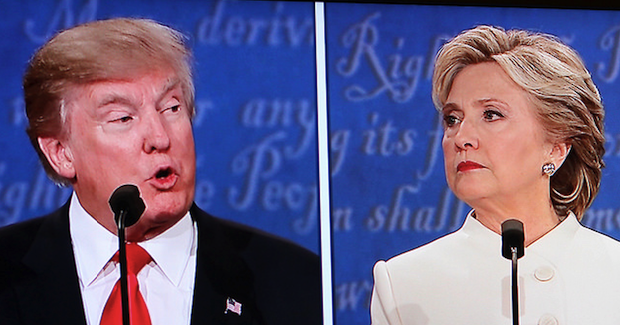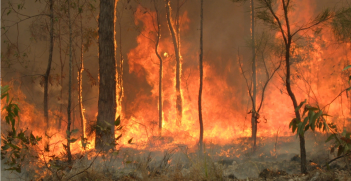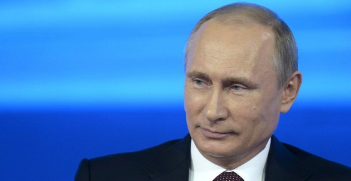The Next US President is Damaged Goods

In the final days of the campaign we can expect both presidential candidates to continue their policies of further damage creation. It can only conclude with one or other of them entering the White House as damaged goods.
An odd image came to mind while headed towards New York on Melbourne Cup day this week. It is easy to muse when you are at 38,000 feet and the flight attendant is helpfully but unsuccessfully trying to reboot the in-flight entertainment system on an aged Qantas 747. I had just thumbed through the The Wall Street Journal which reported that officials of the United States Justice Department were scrutinising 500,000 emails to see if any one of them contained information that could lead to action being taken against the presidential candidate of the Democratic Party, Hillary Rodham Clinton.
Perhaps Donald Trump was on the ground below us, using the final days of his campaign, to try and win more support from disaffected blue collar workers in a swing state to come out and vote for him, while his vocal band of supporters chanted ‘lock her up, lock her up’.
What could be in those emails? Would we have an answer before polling day, next Tuesday?
And then my mind flipped to a tiny, first-floor room in a modest but expensive residence in London’s Belgravia. The occupant of the room, an Australian, a man who has not been out and seen normal daylight for four years, surely would know the answer?
This, of course, is Julian Assange, founder and owner of Wikileaks, serial trafficker in criminally-hacked emails, who remains incarcerated in the embassy of Ecuador in Britain, having successfully sought political asylum there after Sweden’s police said they wanted him for questioning on sexual assault charges. London’s Metropolitan Police no longer maintain a 24-hour watch on the embassy, but Assange does not venture out because he knows he will be arrested. Something that might lead him, via an extradition process, into the hands of the FBI, which, he argues, is out to get him for the first big Wikileaks distribution of US classified documents that brought him to prominence all those years ago.
Curiously, Assange, who is regularly visited by a faded actress model who brings him edible food, and occasionally pops up chatting to Phillip Adams on ABC’s Radio National, has been uncharacteristically silent on the latest batch of leaked emails that have landed Clinton in trouble. Nor do we know if there are more in the works, for possible release before or after election day.
Nor, for that, matter, do we know who will win the presidential election. Picking a winner is as big a gamble as a bet on the Melbourne Cup. Seasoned commentators looking on from Australia equivocate.
Once down on the ground in New York, the home of both the candidates, you realise there can be no winners. “It’s just horrible”, says a seasoned producer who though she had seen the worst. “This will have a bad ending”.
There are several scenarios under discussion. Given that no one now expects a landslide for Clinton, as predicted by some polls a week ago, these scenarios all take into account the outcomes of the elections for the House and the Senate.
A week ago, had Clinton convincingly won the presidency, and the Democrats the Senate but not the House, it was a reasonable to presume that Trump would predictably have cried ‘foul’ but gone away. The Republicans, having rid themselves of a candidate most of its leaders despised, would have reorganised House Republicans and formed a half-decent opposition to keep Clinton in check. Now, if the Republicans win the House and Trump just falls short of winning the presidency, it will be hard to impossible for them to dump him, and he will be sharpening his knife for any opportunity for impeachment.
A Clinton presidency, with both a hostile House and Senate, would be undesirable and frustrating, but as things stand today looks unlikely.
What if Trump were to win? A Republican House and a Democratic Senate, would be the least undesirable, as the Senate would put a break on some of his wilder aspirations. But even this outcome would provide traction for his protectionist leanings.
For all of Clinton’s failings, her record as secretary of state, harder and tougher than John Kerry, and the possible re-appearance in the administration of Kurt Campbell, her former assistant secretary of East Asian and Pacific Affairs, would be a better outcome for Australia.
Under Trump, the pivot to Asia would be gone, and the engine of growth of the last quarter century—free trade—would be jeopardised.
As it happens, the Trans-Pacific Partnership, the trade agreement which involved thousands of hours of complex negotiations, is dead in the water, whatever the outcome. How ironical that just 100 miles north of here, in Ottawa, Canada, you have a democracy that is now putting America to shame and only this week concluded a new free trade agreement with that most tricky of communities, the European Union.
In the final days of the campaign we can expect both presidential candidates to continue their policies of further damage creation. It can only conclude with one or other of them entering the White House as damaged goods.
Colin Chapman is a writer, broadcaster and public speaker who specialises in geopolitics, international economics, and global media issues. He is the immediate past president of AIIA NSW.
This article is published under a Creative Commons Licence and may be republished with attribution.





